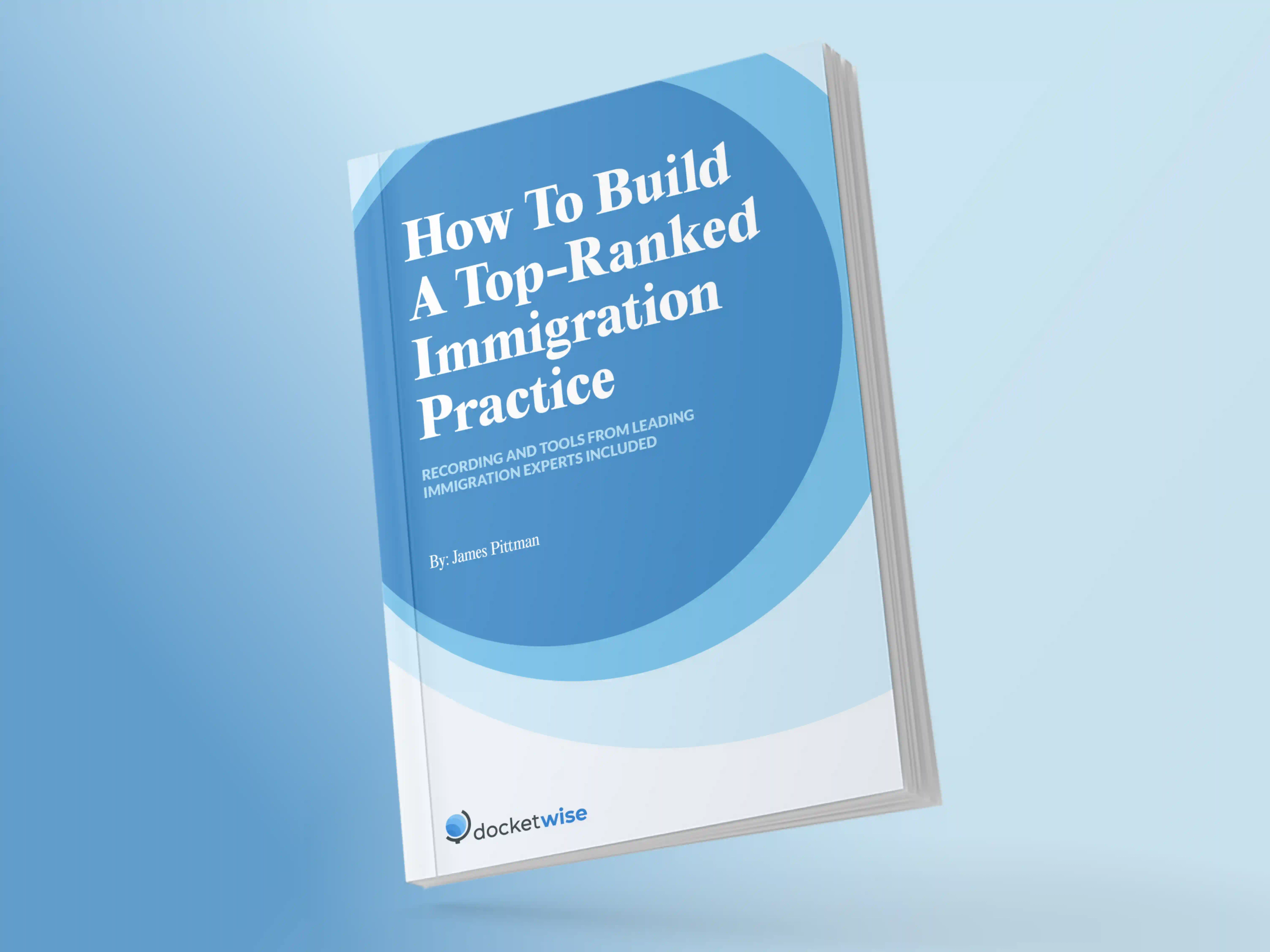Podcasting has become one of the most popular forms of media in recent years and is one of the fastest growing forms of communication today. Indeed, industry statistics show that there are over 2 million podcasts available to listen to through different platforms, with over 70% of Americans reporting they know about at least one podcast. For what it’s worth, in addition, projections show that the podcasting industry will generate over $4 billion in revenue by 2024.
As an immigration lawyer, especially if you’re already leveraging digital marketing to grow your law firm, starting a podcast could be a very powerful tool in your marketing arsenal.
So, in this article, we’ll go into the benefits of podcasting for your firm, why you should get started, and some ideas on how to structure your podcast. By the way, this is part one of a two-part series, so if this article convinces you to look further into starting a podcast, part two will dive into the equipment and tools you need to actually get started.
Three benefits of podcasting
Let’s talk about three major benefits that having a podcast can bring to your immigration law firm.
1. Podcasting helps you build relationships
As a podcast host, you’re establishing relationships with two groups of people: your target audience, who are ideally prospective clients, and your guests, if you choose to have guests as part of your show.
First, given that the intention behind a podcast content is to bring value to your target audience, keep in mind that by doing that, and by being in their ears as they listen to you, you’re building a relationship with them. Just like listeners feel that they have a relationship with long-running radio shows hosts, podcasts, which can be considered the modern manifestation of radio, can create the same impact.
Second, if your podcast features guests, remember that you build a relationship with those guests simply by having them on! Whether these guests are colleagues, former clients or others that you believe will bring value to your target audience, the fact that you are giving them a platform to share their thoughts, their expertise and their story creates a positive relationship. While there is inherent value in simply having these relationships with more people, the more business-focused benefit of this is the fact that these guests are then more likely to think of you when they need immigration services or refer you to someone who does.
2. A podcast can help you advertise your services without being salesy
An immigration attorney with a podcast focused on immigration topics not only builds your expertise, it also provides opportunities for you to remind your audience how to contact you with questions or to discuss their specific matters in a way that doesn’t come off as pushy or salesy. For example, if you have a recurring immigration column or blog, your podcast is a great way to remind people to visit your website blog to learn even more - once they’re there, they can be prompted to contact you for a consultation, at which point that “call to action” may feel more appropriate and not overly pushy.
Make sure to remind your audience on each episode of your podcast where they can find your website or social media accounts, and provide links in your show notes. While it may seem redundant to do this on every episode, remember, each episode you may be reaching someone new who isn’t familiar with you, so it’s important that each time you communicate with your audience, they know how to contact you!
3. Podcasting is media, and a media presence attracts more media attention
Podcasting is a great way to build a media presence without having to go through traditional channels, i.e. be on an existing radio show or mass media station. In a sense, the very idea that you can create your own show and simply put it out there without traditional media gatekeepers is remarkable. But because traditional media still does wield a lot of influence, getting interviewed by a major news station or getting onto an NPR news segment can be a boon for your business. With a podcast, you give yourself the opportunity to be found that you might not otherwise have had. If a major show is looking for a new immigration law expert to interview, having a podcast quite literally allows them to hear what you would sound like on their show, which may help you land the opportunity.
In addition, hosting a podcast can help you strengthen your appeal when you apply to speak in person at industry events. Not only does hosting a podcast with regularly scheduled episodes keep your speaking skills sharp, but as your podcast grows in popularity, you can use those figures to boost speaking engagement application.
Three Podcast formats immigration lawyers can consider
When you think about starting your own podcast, it may sound like a big undertaking. And yes, it could be, if you’re envisioning becoming a hit sensation like Serial. But every podcast starts somewhere, and to start one, all you really need is a computer, an internet connection, a microphone, and a format. Here are two podcast formats you can consider.
1. A podcast featuring just you as the host
Doing a solo podcast is the most straightforward way to start. This format lets you maintain a predictable schedule, avoid having to coordinate with guests, and otherwise minimizes the variability of the show. Of course the flip side is that the content relies entirely on you as the speaker, which may seem daunting at first. But remember, this is your show, and you can make your podcast episode as long or as short as you want! For example, you can set a time limit of 20 minutes per episode, which is a good length to discuss a topic in some depth without being too exhaustive. Or you can go even shorter - there are plenty of podcasts with 7-10 minute “quick bite” episodes.
2. A podcast featuring one or multiple guests
If you’d prefer to have one or multiple guests on your podcast, you can either ask pre-determined questions and conduct a more formal interview or you could have a more fluid discussion. A podcast featuring guests has two significant advantages, and two important disadvantages. As for the advantages, having guests on your podcast increases the value you deliver through your episodes by multiple points of view, and takes the pressure off of you to carry the discussion alone. On the other hand, the disadvantages of having guests are that you have to book them and schedule the recording around their availability, and the resulting risk of having last-minute cancellations.
3. A podcast with a co-host.
Having a consistent co-host on your podcast is a nice in-between strategy. You’re not alone, so you don’t have to fully carry the conversation, but you’re also not dealing with guest interviews and exposing yourself to the potential disadvantages there.
At the end of the day, there’s no right answer. And remember that creating a podcast should be fun. If you feel empowered being the only one on “stage,” consider doing a one-person show. If you love interviewing people or otherwise having a dialogue, consider a podcast with guests or at least a co-host. At the end of the day, once you choose your format and decide on a topic of discussion, just get started!
You’ll get better along the way, and remember that if it gets to be too much you can always put the podcast on pause or stop it altogether.
Let Docketwise Streamline your immigration law firm while you focus on marketing
A case management system like Docketwise can help you save time, time that you can reinvest into things like starting a podcast for your immigration law firm, which can lead to more clients, growth, and exposure for you and your firm.
Docketwise has a full library of immigration forms, easy-to-use client questionnaires and industry-leading API integrations. Docketwise also help you stay up to date on all your immigration cases, communicate easily with your clients, and otherwise build and manage your immigration law firm.
If you want to learn more about Docketwise, schedule a demo at the link below, or sign up for our Immigration Briefings newsletter for daily and weekly immigration updates!
Unlock Your Success as an Immigration Lawyer.
Download Now
About the author

James PittmanAttorney & Co-FounderDocketwise
James Pittman is co-founder of Docketwise and was previously engaged in the private practice of US Immigration Law. He also regularly teaches Continuing Legal Education (CLE) classes on immigration law topics and legal ethics. He is admitted to practice in New York and New Jersey and is a graduate of Northeastern University School of Law.
